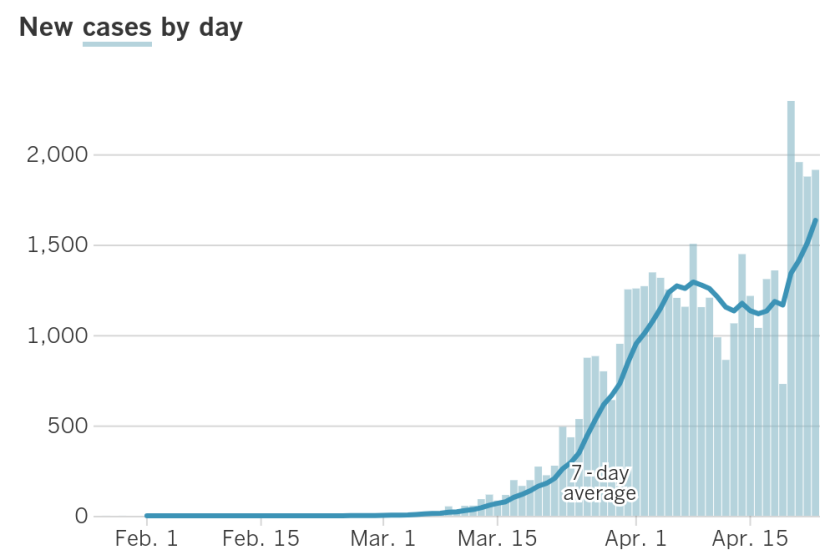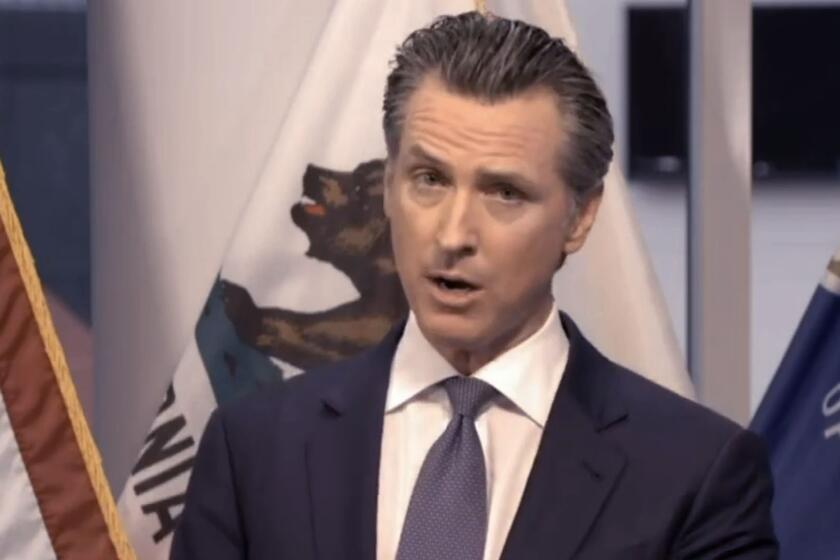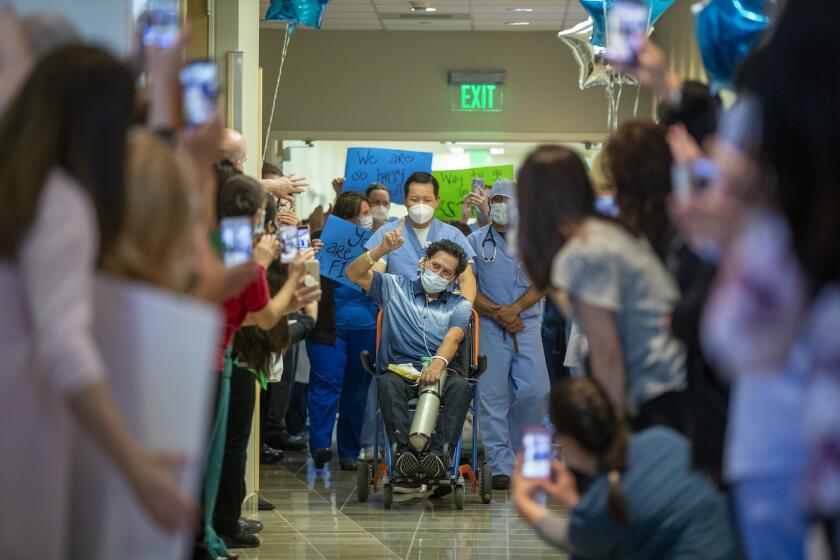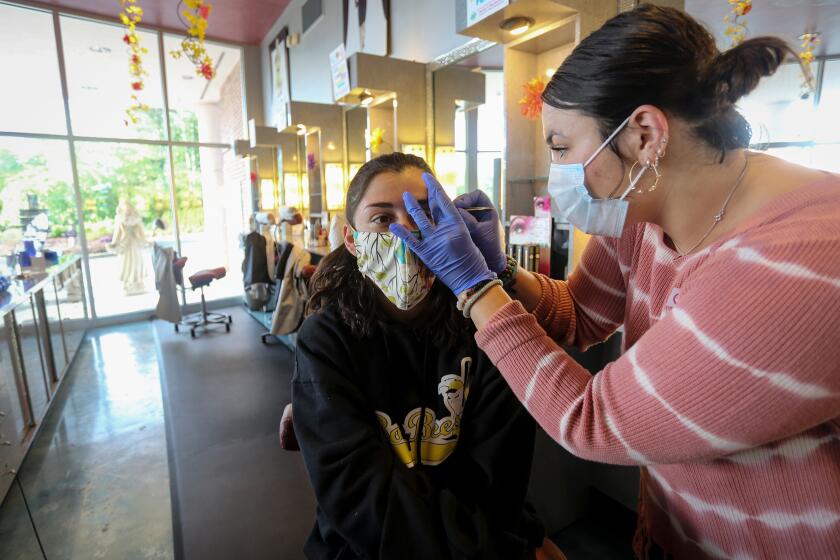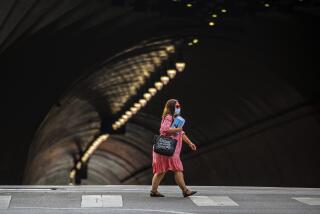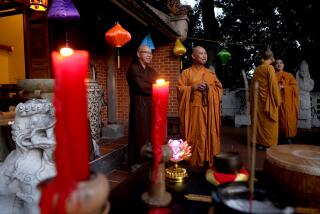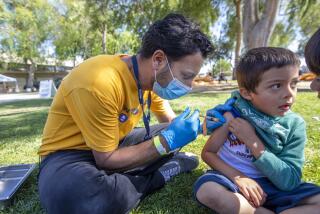California coronavirus cases top 40,000, with nearly half in L.A. County

- Share via
The number of coronavirus cases in California surpassed 40,000 on Friday as a weekend heat wave threatened to drive crowds to the state’s beaches.
Nearly half of the state’s cases are in Los Angeles County, which reported 1,035 additional COVID-19 patients on Friday and 52 new deaths. Long Beach, which has its own health department, also reported an additional two deaths and 22 cases Friday, bringing the county’s total to 850 deaths and 18,539 cases.
Of the latest L.A. County deaths, 43 patients were over 65, seven were 41-65, one was 18-40, and three victims’ ages were unavailable. The majority of them had underlying health conditions, according to Barbara Ferrer, the county’s public health director.
“Those of you who are grieving the loss of a loved one from COVID-19, we are really sorry for your loss and we wish you and your family peace,” Ferrer said.
The number of coronavirus cases in nursing homes and other institutional settings had soared to 5,339 at 293 facilities, Ferrer said, including 3,847 residents and 1,492 staff. The rise coincides with an increase in testing in those facilities, leading to infections identified among asymptomatic people.
A total of 365 residents who lived in institutional settings have died from COVID-19, with the majority of them nursing home residents, Ferrer said. They now account for 43% of the deaths in L.A. County.
In a bid to slow the virus’ spread among vulnerable populations, the county’s health officer, Dr. Muntu Davis, will be issuing a new order requiring that all licensed group healthcare facilities limit entry to workers and residents and suspend communal dining and activities. Both residents and staff at the facilities will be required to wear face coverings, Ferrer said.
Institutions now are required to conduct testing for all residents and staff, whether symptomatic or not, a process that will begin Monday, Ferrer said. She said that facilities with the most severe outbreaks will be prioritized for the stepped-up testing.
Medical teams from the California National Guard also have been dispatched to five skilled nursing facilities in L.A. County to assist with staffing shortages due to coronavirus outbreaks.
The eight-member teams arrived earlier this week at the Eastland Subacute and Rehab center in El Monte, the Pasadena Meadows Nursing Center in Pasadena, the Motion Picture and Television Country House and Hospital in Woodland Hills, the Gardena Convalescent Center in Gardena and the Hollywood Premiere Healthcare Center in Los Angeles, said Lt. Col. Jonathan Shiroma, director of public affairs for the California National Guard.
They will stay for as long as is necessary, and other teams may be dispatched if the need arises, he said.
Ferrer said that the deployment came in response to a request from the county Department of Public Health that the state help with staffing at some of the skilled nursing facilities that have been hard hit by coronavirus outbreaks.
“As we’ve identified staff that are sick or staff that are positive with COVID-19, they need to stay out of the workplace for an extended period of time, and in places where there are outbreaks, that can mean there are dozens of employees that are appropriately not coming to work,” she said. “So we do have staffing issues in all nursing homes where we’ve had significant outbreaks.”
Gov. Gavin Newsom faces pressure to reopen California’s economy, but a spike in coronavirus cases keeps stay-at-home orders in place for now.
As of Friday, more than 108,000 people across the county had been tested for the coronavirus and received their results, with about 15% testing positive, Ferrer said.
There currently are 1,858 people with COVID-19 hospitalized in L.A. County, with 30% in intensive care and 19% on ventilators, Ferrer said. She said that while the overall number of cases has increased over the last few weeks, those indicators have remained fairly stable.
The state saw its worst one-day fatality total Wednesday, and the rate of new cases, after seeming to flatten, is rising amid more widely available testing. More than 39,600 cases have been reported across California, with a 5% increase from Thursday to Friday, and more than 1,500 people have died across the state. Ninety-three people died in California on Thursday alone, Gov. Gavin Newsom said Friday.
“Those should be sobering and cautionary statistics as it relates to the desire that we all have to get back to some semblance of normalcy and answer the question of when that will happen,” he said.
Still, he said, hospitalizations have remained basically flat at 3,344 COVID-19 patients. Of those, 1,216 are in intensive care, an increase of just 1% from the day before, Newsom said.
More than 1,800 people have died across the state, with Wednesday marking the highest daily fatality total. “It’s a reminder we’re not out of the woods yet,” Gov. Gavin Newsom said Thursday.
Meanwhile, county officials said Friday that they are developing a plan to slowly ease stay-at-home orders, but four key benchmarks must first be met.
“We don’t want to undo all the good we’ve done and accomplished so far,” Supervisor Kathryn Barger said. “We are not yet on the other side of this pandemic and we don’t want to prematurely ease restrictions.”
She said that the county will first need to make sure that its hospitals maintain capacity to treat both people who are sick and those with standard medical needs. That includes ensuring the hospitals are adequately staffed, have enough resources to perform testing, and have a sufficient number of ventilators and other medical supplies to handle routine care as well as possible influxes of COVID-19 patients.
Second, the county will need to make sure that protections are in place for those who are most vulnerable, including the elderly, homeless people and those who live in institutional settings or don’t have access to services, Barger said.
Third, the county must have the capacity to test, isolate and quarantine all those who are ill, as well as to conduct surveillance to prevent further spread, she said.
These are some of the unusual new scenes across the Southland during the coronavirus outbreak.
And fourth, the county must maintain physical distancing and infection control measures, including by providing businesses with educational materials and guidance to ensure that the rules can be followed when they reopen, she said.
“Ultimately, we want to make sure that as many people return to work as safely and as quickly as possible,” Barger said. “If we meet the guidelines I shared, we can prevent or limit the spread of COVID-19 when we loosen physical distancing measures.”
The coronavirus became the leading cause of death in Los Angeles County on Thursday as the number of fatalities continued to climb statewide. Nationwide, the U.S. death toll from COVID-19 surpassed 50,000 on Friday.
Even though California has been bending the coronavirus curve, and seeing a far less dire toll than places such as New York and New Jersey, the continuing spike in cases and deaths is one of several factors keeping officials from moving toward easing any of the social distancing rules.
Newsom reiterated Thursday that it is too early to lift those rules and urged people to stay home despite this week’s heat wave.
With Los Angeles beaches closed and potential record temperatures expected, some officials have raised concerns that people could flock to beaches in neighboring Ventura and Orange counties, which have reopened portions of their shorelines.
Ferrer has said repeatedly that the beaches must remain closed to prevent an overflow of visitors who might be carrying the potentially deadly SARS-CoV-2 virus. She has asked L.A. residents not to crowd beaches in other counties.
“We have high rates of illness and a lot of people in our county who are dying. We know it’s best right now for us Angelenos to stay home, or stay outside [in] your own yard or your own neighborhood,” Ferrer told the media Wednesday. To do otherwise, she said, would increase the risk of bringing the infection to L.A. “And we absolutely don’t need that.”
During his live nightly briefing on Friday, Mayor Eric Garcetti acknowledged that this weekend’s hot weather would create a temptation for the public. But he implored residents to stay home — no golf, no tennis, no beach — saying one bad weekend could “reverse a month of work” fighting the spread coronavirus.
“A day or two of fun, leading to weeks more of us being in our homes and not being able to go out, simply isn’t worth it,” he said.
Garcetti said Angelenos who need to cool off can visit the city’s four cooling centers, which will be open Friday and Saturday from 11 a.m. to 6 p.m. The locations are the Lincoln Heights Recreation Center, the Mid-Valley Senior Center in Panorama City, the Robert M. Wilkinson Multipurpose Center in Northridge and the Sherman Oaks East Valley Adult Center. A full list of L.A. County locations is available on the county’s website.
Those who visit L.A.’s cooling centers will need to adhere to social distancing guidelines and keep their mouth and nose covered, according to Garcetti’s office. Nurses will screen clients before they enter.
Public officials and those patrolling beaches say that compliance with the shutdown has been high, with only about half a dozen people cited in more than a month for breaking the county beach ban. Politicians including Garcetti and Newsom, as well as the L.A. County supervisors, cite polls showing public support for hunkering down longer to slow the coronavirus.
Most recently, survey results released Friday indicate the vast majority of California residents support the restrictions.
Among those polled, 75% want the order to continue as long as it’s needed, according to a California Health Care Foundation/Ipsos survey. Only 11% wanted to stop the stay-at-home order, while 13% had no opinion. Among low-income residents, support was even stronger: 78% support the stay-at-home order and only 3% oppose it.
The majority polled also said they are following various guidance from health officials, such as wearing masks, avoiding trips and staying at least six feet apart.
The poll involved more than 1,000 interviews between April 17 and April 22 and had a margin of error of plus or minus 3.1 percentage points.
The governor said those who do choose to be outdoors this weekend should visit only open locations and ensure they remain physically separated from others as has been done over the last five weeks since he imposed a statewide stay-at-home order. If Californians don’t do that, Newsom said, he fears he’ll soon be reporting a sizable increase in the number of confirmed cases and possibly hospitalizations.
“I don’t think anybody wants to hear that. I don’t want to share that information. But that’s really less up to me, it’s more up to all of you,” he said.
On Wednesday, Newsom said most of the six milestones he set to consider loosening the stay-at-home order he issued last month have not been met. The only change the governor has made is to allow some elective surgeries to again be scheduled in hospitals, citing sufficient capacity.
“It will be those indicators that drive our decision-making,” he said Thursday. “Not dates. We don’t debate dates. We look at the facts objectively.”
Wigglesworth, Fry and Rainey reported from Southern California; McGreevy and Myers from Northern California. Times staff writer Emily Alpert Reyes contributed to this report.
More to Read
Sign up for Essential California
The most important California stories and recommendations in your inbox every morning.
You may occasionally receive promotional content from the Los Angeles Times.
